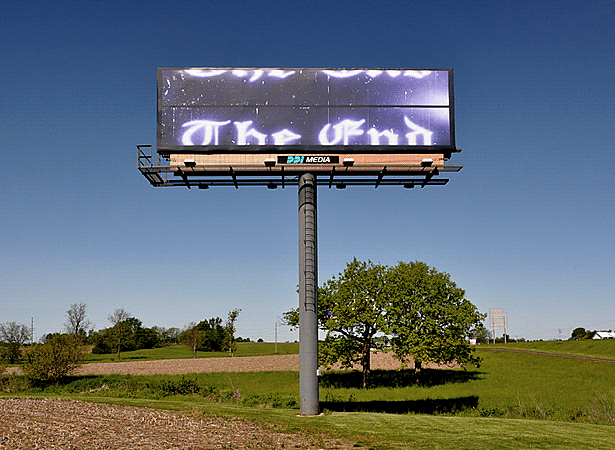May–June, 2016
Ed Ruscha
Main billboard
Interstate 70 exit 144
Hatton, Missouri
Eric Oglandler
Satellite billboard
Interstate 70 exit 188
Warrenton, Missouri
www.i70signshow.org
Instagram / Twitter
The I-70 Sign Show installs contemporary art on Missouri interstate billboards as commentary on the state’s signage surplus—five times the national average—and the culture-war messages that proliferate along the 250 miles between St. Louis and Kansas City. Artworks inserted into this landscape engage themes such as religion, race, sex, gender, politics, labor, beauty, and consumption. Each image appears for two months on the main Sign Show billboard, at the edge of a family farm, then moves for a second display period at a “satellite” location elsewhere on the interstate. The billboard company assigns the satellite boards based on availability, making them different each time and lending the project an element of chance. The potential meaning of the art shifts with the change in terrain, architecture, population, and surrounding signage, often becoming more poetic or political in its new context.
Currently on the project’s main billboard, a detail of Ed Ruscha’s painting Asphalt Jungle Panoramic Stretch connects the wide formats of sign and screen. An out-of-sync, old-fashioned movie reel frozen between frames suggests both stasis and movement. The complete picture eludes us, much like the fugitive appearance of signs glimpsed from a fast-moving car. A narrative interrupted, “The End” becomes neither past nor future but something in between, a progressive, possibly immanent, event. Ruscha’s image—with its Biblical Old English font—speaks to the interstate’s many Evangelical Christian billboards, some of which warn travelers that “Hell is Real” or ask what they will tell “Him” at “The Gates.” At the same time, ideas of endlessness and horizontality remind us more generally of the open road. Raised in Oklahoma, Ruscha is most closely associated with the culture and landscape of Los Angeles. The conceptual artist’s installation in Missouri recalls his Midwestern roots as well as some of his earliest work, from the 1960s, in particular his photographs of gas stations along Route 66.
For his ongoing Craigslist Mirrors project, Eric Oglandler culls the classified-ad website for photos taken by people selling mirrors. He collaborated with the I-70 Sign Show to select one of his archive’s many images of car mirrors and cars reflected in mirrors, cropping and enlarging it to fit the 14-by-48-foot billboard. Installed on the main sign in March–April, Craigslist Mirrors spoke to issues of desire and identity in contemporary American life, in addition to the inevitable on-the-road themes of driving and consumption. Now in its second, satellite location, Oglander’s image presents a more pointed message about digital culture, commerce, and reuse. After filling an otherwise empty billboard, the Craigslist Mirrors photograph stands next to a failed and nearly abandoned outlet mall. Once geared toward bargain hunters, the mall has most likely been made obsolete by the convenience and sheer product volume of web-based second-hand shopping and auction sites—craigslist, for example, also a source of found images for an art practice. The two cars pictured in Oglander’s billboard only emphasize the emptiness of the parking lot in the distance. It seems fitting, somehow, that the lone remaining vendor in the mall is a thrift store.
About the I-70 Sign Show
The I-70 Sign Show, founded and curated by artist Anne Thompson, launched in April 2014 with work by Kay Rosen. Other participating artists have included Mel Bochner, Mickalene Thomas, Kim Beck, Ken Lum, Karl Haendel, Ryan McGinness, Marilyn Minter, and Jeff Gibson.
About the Donald W. Reynolds Journalism Institute
The Reynolds Journalism Institute engages media professionals, scholars and other citizens in programs aimed at strengthening journalism and communication in the service of democracy. Part of the Missouri School of Journalism at the University of Missouri-Columbia, RJI generates and tests new techniques and new thinking that promise to help us understand and meet the information needs of individuals in their roles as citizens. Through its fellowship program, RJI supports a variety of projects, including those focused on inclusivity and engaging communities.



